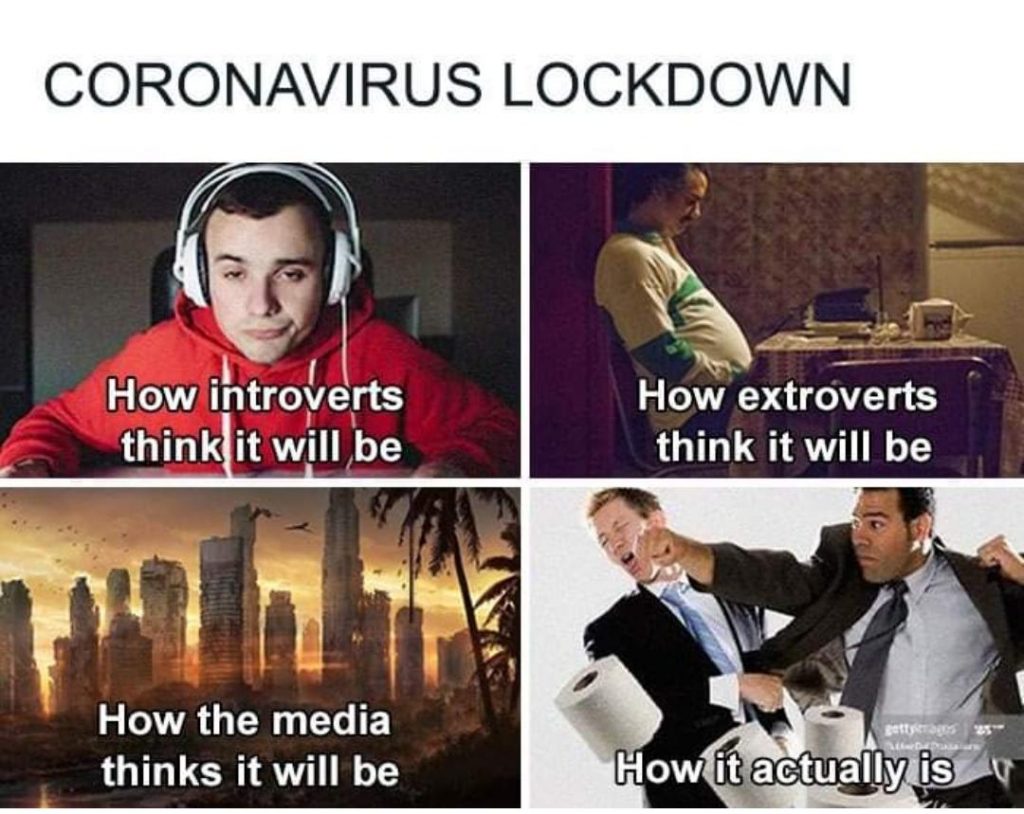One of the core facets of my personality—something I’ve always known about myself, and that I’ve come to further understand since becoming familiar with the Enneagram—is that I like I like to BE RIGHT and to do things THE RIGHT WAY. This was true for me in school, it’s been true in marriage and parenting, and it turns out that it’s also true when it comes to my approach to global pandemics.
When our nation started to unravel at the beginning of March, I quickly became fixated on the news, determined to learn all I could about what was taking place. I soaked up countless facts and opinions about the All Things Coronavirus, from medical statistics and models, to opinion pieces regarding social and economic impacts, to ideas for navigating life while sheltered in place. This insatiable thirst for “coronavirus knowledge” was my attempt to maintain some pretense of control by trying to make sense of all that was going on.

I can see now how my perfectionism came to play, even in this: I felt compelled to gather as much information as I could in order to make the “right” (read: “perfect”) decisions for myself and my family amidst this crisis. I wanted to stock up on the appropriate supplies without appearing paranoid or contributing to hysteria-fueled shortages. I wanted to practice just the right amount of social distancing—complying with the rules, without blindly accepting government mandates. I wanted to offer appropriate levels of empathy to those in crises, while also recognizing the silver linings within the situation. I wanted to keep our family physically, emotionally, and spiritually healthy in the best ways possible.
In my pursuit of the perfect coronavirus response, I repeatedly turned to other sources to help me navigate this unfamiliar terrain. But as days turned into weeks and then months, it soon became clear that there was no perfect road map. . . at least none that everyone could agree on. A situation that had initially brought unity was quickly tearing people apart as we each developed our own opinions about the severity of the illness, the necessity of business closures and social distancing, and whether or not self-improvement checklists and homeschooling were truly necessary. Even the experts couldn’t agree, so how was I—a young mom with no medical or economic expertise to speak of—supposed to know what my own response should be? And to take things to a much darker, more toxic level: how should I feel towards those around me who weren’t making the same choices? Because, as every perfectionist knows, the impossible standards and harsh judgments we impose upon ourselves inevitably spill out onto others . . . so yes, to be completely transparent, I’ll admit that I was starting to have some feelings about people who weren’t responding exactly like me.
While my search for absolutes yielded zero answers, I did come across a quote that has helped me reframe my views on all that is going on: “We are in the same storm, but not in the same boat. Your ship could be shipwrecked and mine might not be. Or vice versa.” While it’s true that this situation is something all of us are facing, we come to it from different places. It’s completely rational and totally appropriate that we would all have different responses. Those with compromised immune systems will be fearful of getting sick, while those living below the poverty line may be more concerned about losing their jobs. For some overscheduled families, the time together at home is a blessing; for others, it may be awkward or potentially dangerous. Some Type A moms are relishing the chance to schedule every minute of their children’s daily routines, and others need to accept that schooling may not be happening right now . . . and that’s okay. Some of us survive each day by focusing on the positives, while others need to accept and grieve difficult losses.

Our boats within this storm offer different levels of safety and protection. Some of us will emerge from this storm unscathed; others might not be so fortunate. Rather than responding critically towards those in differently shaped boats, I need to offer empathy and grace. And this goes for myself—while my watercraft is consistent, the storm we are in is a dynamic one that requires different responses by the day. NONE of us has ever experienced anything quite like this before, so we can’t expect ourselves (I can’t expect myself) to know exactly how to feel or react at any given moment.
In the coming weeks and months, as states begin to reopen and life starts to regain some semblance of normalcy, the disparity in our various sea vessels will likely become more apparent while attitudes and actions grow increasingly politicized. I don’t have all the right answers; none of us do. Instead of seeking constant input from The Experts, or caving to partisan perspectives, I will be trusting the Lord to carry me through the storm, one moment at a time. And I will be forging these treacherous waters with courage, curiosity, and compassion—letting go of judgment and the need for perfection, from myself or from others.